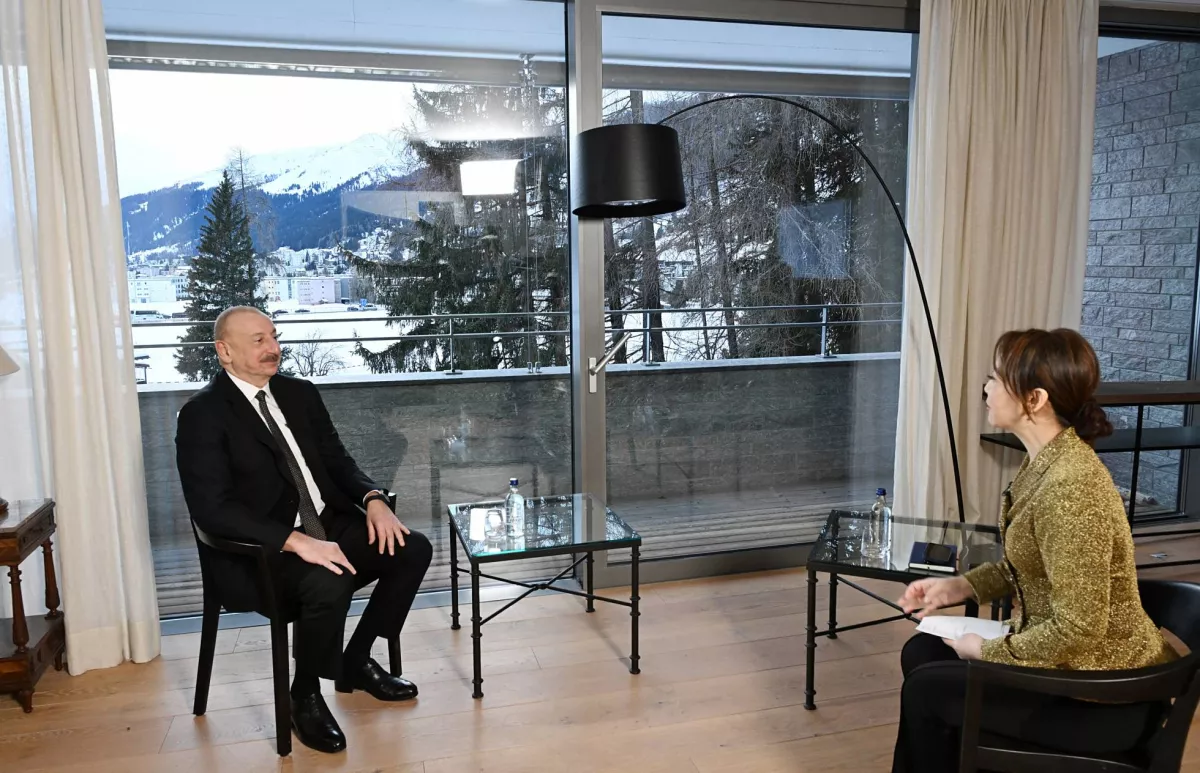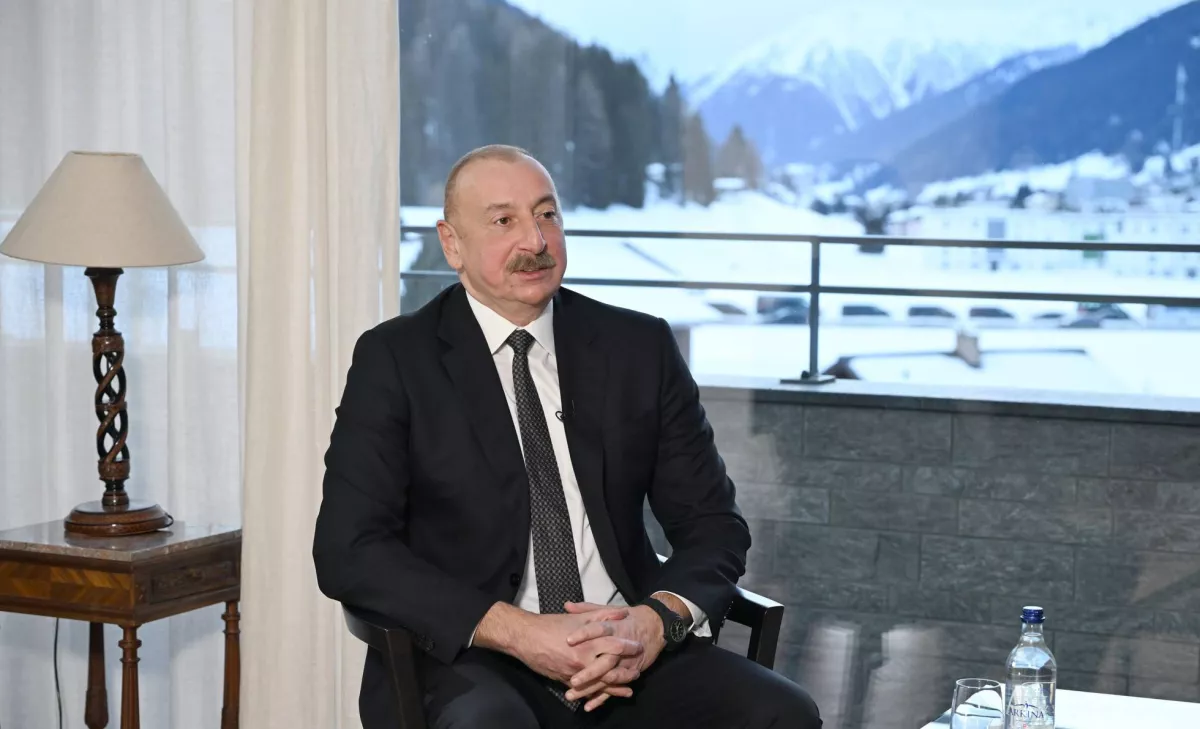Recipes for sustainable development Key vectors of Azerbaijan’s progress on CGTN
On January 20, President of Azerbaijan Ilham Aliyev gave an interview to the Chinese TV channel CGTN (China Global Television Network), which was broadcast on February 11. In the interview, the head of state outlined the key aspects of the country’s economic development, its role in the global market, and its long-term prospects for growth.
Despite the impact of multiple global crises and geopolitical instability, Azerbaijan has managed to minimize external negative effects in recent years and maintain its developmental stability. The country achieved a sustainable GDP growth rate, notably outpacing the non-oil sector's performance, while also increasing its foreign currency reserves and reducing external debt. Large-scale projects continued, including the modernization of the transport system, development of the Middle Corridor infrastructure, green energy initiatives, and significant investments in the reconstruction of the Karabakh region, amounting to billions of manats.
Azerbaijan's successes in pursuing an independent political course and establishing a stable economic foundation were highlighted during numerous meetings and negotiations held by President Ilham Aliyev in Davos in January 2025. These points were also central in the interview given by the head of state to the Chinese TV channel CGTN.
"From the very beginning since the restoration of our independence. We have established a strong, by the way, self-sufficient economy. There's a very low rate of foreign debt vis-à-vis GDP - it's only 6.9%. Based on that, we initiated large-scale projects that created connectivity in the region, and we are well-established in the region of South Caucasus and Caspian, to which we belong," President Aliyev stated in his interview with CGTN.

In this context, the president emphasized that Azerbaijan, located on the East-West route, has developed a modern and advanced transport infrastructure. Today, a key direction for development is the implementation of transport connectivity projects in partnership with China and the Central Asian countries. "[The Middle Corridor] definitely provides an alternative. It provides opportunities for business. Because Azerbaijan’s position on the Middle Corridor is not just to be a transit country and to get more fees from transit. Our target is to build facilities on the route in Azerbaijan and help the private sector take advantage of that," Aliyev emphasized.
Actively cooperating with the countries of Central Asia, as well as with China, on issues of simplifying cross-border procedures, reducing tariffs, and unifying customs legislation, Azerbaijan is simultaneously implementing large-scale projects to update and expand the infrastructure of the Azerbaijani segment of the Middle Corridor, particularly given the rapidly growing demand for freight transportation.
"Our target was to have a handling capacity of 15 million tons at our trade seaport, and that would have been enough for decades. But now we expect 25 million tons within probably 5 or 6 years. So, what are we doing at the moment? We are financing the expansion of our trade seaport and our railroad infrastructure," the head of state emphasized.
Notably, Azerbaijan, through its own financial investments, completed the modernization of the Georgian section of the Baku-Tbilisi-Kars (BTK) railway last year, increasing its capacity from 1 to 5 million tons of cargo per year. At the same time, Azerbaijan is financing the construction of the infrastructure for the cross-border international railway line from Horadiz to Aghband, where about 60% of the 110.4-kilometer section has already been laid. This line is set to become a crucial part of the future Zangezur transport corridor.
"We know that connectivity projects in Central Asia are largely financed by the Chinese government. Another route toward the Caspian - that means toward Azerbaijan - so we must be absolutely prepared for that. I am sure that the ‘One Belt, One Road’ initiative of President Xi Jinping will create additional opportunities for all countries. And again, it is connectivity, a business opportunity, and it is stability and security," President Ilham Aliyev said.
The interview with the Chinese TV channel also highlighted Azerbaijan's achievements in the field of green energy and the implementation of the UN climate agenda, including the goals formulated during the Baku COP29 conference. In recent years, Azerbaijan has adopted a new legislative framework, introducing fiscal and other incentives for investors in renewable energy (RE). As a result, by the beginning of last year, the capacity of RE generation facilities in Azerbaijan's energy system was estimated at around 1,700 MW, and their share in total generation reached 20%. It is expected that by the end of 2027, the share of RE in the country's energy system will account for 33% of total generation, thanks to the construction of eight large-scale solar and wind power plants. These projects will primarily be implemented in Azerbaijan with foreign investments totalling approximately $2.8 billion.
"I think this is the responsibility of countries with fossil fuels, that they need to use their revenues from fossil fuels to invest in green technologies and green energy. That's exactly what we are doing. We have provided good investment opportunities for investors. Our immediate target by 2027 is to have two gigawatts of solar and wind electricity, and by 2030, six gigawatts, which will be kind of a revolution in the energy mix in Azerbaijan," the head of state noted.

President Ilham Aliyev also reminded of China's leading position in the world in the development of green technologies and their affordable pricing. He emphasized that in the projects being implemented in Azerbaijan, investors are also using solar panels from Chinese manufacturers, and Chinese technologies will be used in the project for implementing battery storage systems for green energy.
"Now Chinese companies are also interested not only in providing services and technology but also in investing in Azerbaijan. This is already in the pipeline. At COP29, we signed an agreement between Azerbaijan, Kazakhstan, and Uzbekistan to build an energy cable under the Caspian Sea," President Ilham Aliyev noted, also recalling another project that involved laying a cable from Azerbaijan to Europe across the Black Sea. This refers to the agreement signed on December 17, 2022, between Azerbaijan, Georgia, Romania, and Hungary for a strategic partnership in the joint laying of the 1,195 km long Black Sea Energy undersea electrical cable with a capacity of 1 GW across the Black Sea bed.
According to preliminary estimates, the cable's capacity will enable the annual delivery of up to four gigawatts of green electricity to Europe. "This is another connectivity. This is a corridor for green energy with huge potential. Because Azerbaijan's wind and sun potential is already fixed, and it is much more than we could have imagined. Therefore, we need markets, technology, and cooperation. Because without cooperation between neighbours, you will not be able to implement these projects," the head of state emphasized in the interview.
Furthermore, President Ilham Aliyev explained the reasons why Azerbaijan has not yet become a member of the World Trade Organization (WTO).
"We are still not a member of the World Trade Organization, although we have been in an active phase of negotiations for many years - I would say for at least a couple of decades. The reason why this process did not come to its logical conclusion is exactly what you said. Protectionism, double standards, tariffs – all of these disrupt the core values of the World Trade Organization. We see that countries can apply tariffs and use protectionist mechanisms in order to protect their markets, which absolutely contradict the principles of WTO," President Ilham Aliyev emphasized.
He noted that Azerbaijan continues negotiations for WTO membership, but at the same time, it carefully assesses the advantages and disadvantages observed along the way.
As the head of state mentioned, today the main part of Azerbaijan's exports consists of fossil fuels, and there is no need for WTO membership to sell raw materials on the market. However, further efforts are needed to increase the volume of domestic non-oil industries and enhance export potential in order to better prepare for the realities of global competition. "So, opening the market to all the world members of WTO will increase competition. But at the same time, may damage the interests of local producers. Therefore, we are balancing this process and trying to get maximum conditions, positive conditions, while we will be in the future negotiation process," President Aliyev told CGTN.








